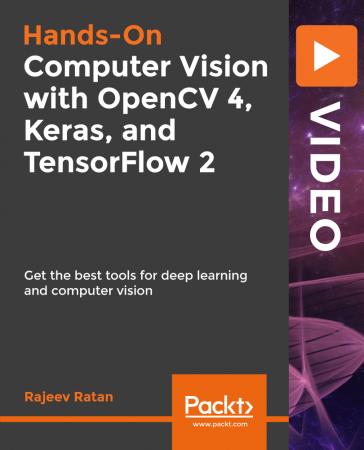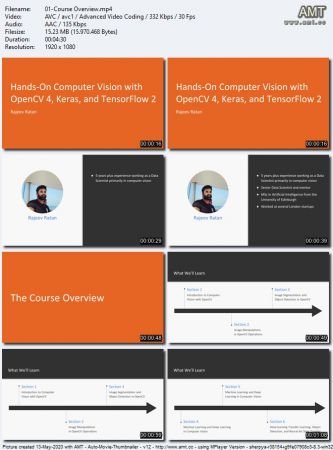MP4 | Video: h264, 1920x1080 | Audio: AAC, 44.1 KHz, 2 Ch
May 12, 2020 | ISBN: 9781839211768 | English
Duration: 45 Lessons (6h 7m) | Size: 1.2 GB
Build your own computer vision deep learning classifiers
Learn
Image manipulations (dozens of techniques-such as transformations, blurring, thresholding, edge detection, and cropping)
How to segment images using a variety of OpenCV algorithms, from contouring to blob and line detection
Approximate contours and perform contour filtering, ordering, and approximations
Perform object detection for faces, people, and cars
Use Machine Learning in computer vision, including understanding Deep Learning models such as convolutional neural networks
Create a varying range of image classifiers-for example, recognizing handwritten digits, gesture recognition, and other multi-class classifiers
Perform facial recognition with deep learning
About
Do you want to understand how computers see images and videos? Using artificial intelligence, we can enable computers and smart devices to interpret what is in an image (computer vision).
This can provide massive benefits when it comes to automating tasks for which images are vital, such as examining medical images or enabling self-driving cars to see. Already, these applications are creating a massive industry around computer vision-one that is set to grow rapidly, with some sources predicting that it will be worth over $43 billion by 2023.
This course provides you with a perfect foundation from which to understand computer vision and supports your professional development in this fast-growing arena. We first learn the basic concepts and explore these using OpenCV4, the most popular open-source computer vision library. Next, we explore using Machine Learning in computer vision, including the use of deep learning (using TensorFlow 2.0 and Keras) to implement advanced image classifiers.
This course is designed to help data scientists, and those who already have some familiarity with ML and DL (and experience with Python, Keras, and TensorFlow), to gain a solid understanding of OpenCV and train their own computer vision deep learning models.
Features
Gain a solid understanding of core computer vision concepts using OpenCV, and utilize deep learning to create advanced computer vision models
Learn quickly without being bogged down by complex mathematical theory
Use the latest libraries including the latest version of OpenCV 4, Keras, and TensorFlow 2.0-all running on Python 3.8
Screenshots
Download link:Kod:rapidgator_net: https://rapidgator.net/file/9ef38fa087e009dc92a4e15182f15e13/yk2kv.HandsOn.Computer.Vision.with.OpenCV.4.Keras.and.TensorFlow.2.part1.rar.html https://rapidgator.net/file/22aae34d03f338872627b530bbdef8fe/yk2kv.HandsOn.Computer.Vision.with.OpenCV.4.Keras.and.TensorFlow.2.part2.rar.htmlLinks are Interchangeable - No Password - Single Extraction
1 sonuçtan 1 ile 1 arası
-
13.05.2020 #1Üye



- Üyelik tarihi
- 20.08.2016
- Mesajlar
- 135.685
- Konular
- 0
- Bölümü
- Bilgisayar
- Cinsiyet
- Kadın
- Tecrübe Puanı
- 143
Hands-On Computer Vision with OpenCV 4, Keras, and TensorFlow 2
Konu Bilgileri
Users Browsing this Thread
Şu an 1 kullanıcı var. (0 üye ve 1 konuk)



 LinkBack URL
LinkBack URL About LinkBacks
About LinkBacks






 Alıntı
Alıntı
Konuyu Favori Sayfanıza Ekleyin